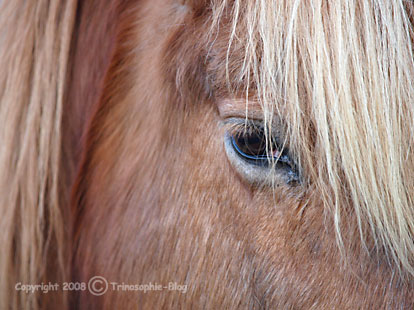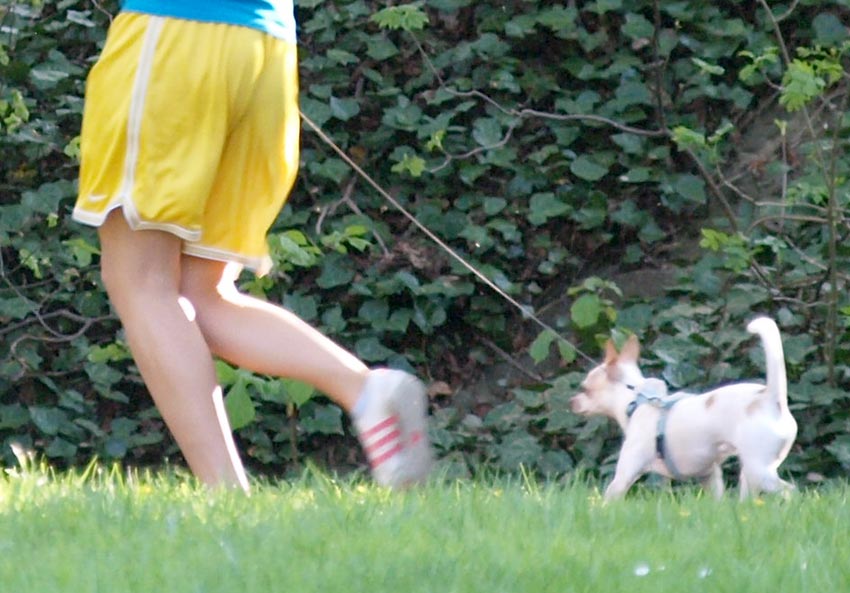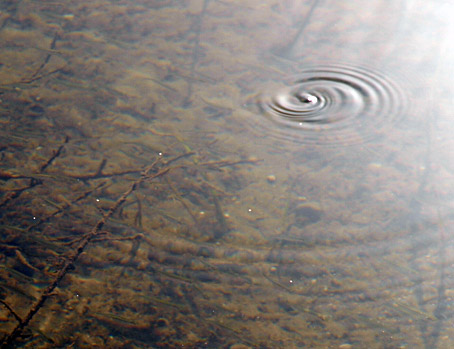Eine vegetarische Lebensweise wird dem Sucher in allen alten Schriften der Weisheitslehre als unverzichtbare Haltung angeraten. Doch dürfen solche Ratschläge nicht aus dem historischen und spirituellen Kontext gerissen werden. Denn: Schafe zum Beispiel sind auch Vegetarier und dennoch weit von „Weisheit“ entfernt.
 Auch Tiere sind beseelte Wesen, dennoch ist fanatischer Vegetarismus eine Form von Anhaftung. Bild: Ko-Sen
Auch Tiere sind beseelte Wesen, dennoch ist fanatischer Vegetarismus eine Form von Anhaftung. Bild: Ko-Sen
Außerdem gehörten die alten Verhaltensregeln zu einem Set von Vorschriften für ein zurückgezogenes meditatives Leben. Wer versucht, die nach außen gerichtete Hetzerei des modernen Lebensstils allein durch rigide Essens- vorschriften zu „spiritualisieren,“ schadet erst seinem Körper und in der Folge auch seinem Geist.
VEGETARISMUS ist vor allem eine LEBENSHALTUNG, ein generelles Achten des Tierreiches. Doch wenn es das Überleben erfordern würde, sich von tierischer Nahrung zu ernähren, wäre es törricht, stattdessen lieber zu sterben. Der irische Mystiker und Theosoph, W. Q. Judge, hat 1892 auf ein Anfrage an sein Magazin THE PATH einen pragmatischen Ansatz zum Umgang mit tierischen Produkten vorgeschlagen – der bis heute nichts an Gültigkeit verloren hat.
W. J. Judge: ABOUT KILLING ANIMALS
A correspondent aks: „Will you kindly explain why, if you think it wrong to kill a water bug, that you should consider it right to slay larger animals for food?“
I do not remember having said it was wrong to kill a water bug: hence there is no conclusion to be made from that to the question of feeding on animals, so far as I am concerned.
The questions of right and wrong are somewhat mixed on this subject. If one says it is morally wrong to kill a water bug, then it follows that it is wrong to live at all, inasmuch as in the air we breathe and the water imbibed there are many millions of animals in structure more complicated than bugs. Though these are called infusoria and animalculae, yet they are living, moving beings as much as are bugs. We draw them in and at once they are destroyed, slain to the last one. Shall we therefore stop living? The whole of life is a battle, a destruction and a compromise as long as we are on the material plane. As human beings we have to keep on living, while in our destructive path millions of beings are hourly put to death. Even by living and earning a living each one of us is preventing some one else from doing the same, who, if we were dead, might step into our shoes. But if we abandoned the fight – were we, indeed, able to so do – then the ends of evolution could not be attained. Hence we have to stay and endure what Karma falls from the necessary deaths we occasion.
So the true position seems to me to be this, that in certain environments, at certain stages of evolution, we have to do an amount of injury to others that we cannot avoid. So while we thus live we must eat, some of flesh and others of the vegetable. Neither class is wholly right or wrong. It becomes a wrong when we deliberately without actual need destroy the lives of animals or insects. So the man who was born in a family and generation of meat-eaters and eats the meat of slaughtered animals does less wrong than the woman who, though a vegetarian, wears the feathers of slaughtered birds in her hats, since it was not necessary to her life that such decoration should be indulged in. So the epicure who tickles his palate with many dishes of meats not necessary for sustentation is in the same case as the woman who wears bird’s feathers. Again as to shoes, saddles, bridles, pocketbooks, and what not, of leather. These are all procured from the skins of slain animals. Shall they be abolished? Are the users of them in the wrong? Any one can answer. Or did we live near the north pole we would be compelled to live on bears‘ and wolves‘ meat and fat. Man, like all material beings, lives at the expense of some others. Even our death is brought about by the defeat of one party of microbes who are devoured by the others, who then themselves turn round and devour each other.
But the real man is a spirit-mind, not destructible nor destroying; and the kingdom of heaven is not of meat nor of drink: it cometh not from eating nor refraining – it cometh of itself.
 Quelle: The Path, Vol. VI, March, 1892, p. 397 (Hervorhebungen im Original kursiv).
Quelle: The Path, Vol. VI, March, 1892, p. 397 (Hervorhebungen im Original kursiv).
Auch Tiere haben eine Seele
Dass trotz allem Pragmatismus nicht vergessen werden darf, dass auch Tiere eine Seele besitzen, eine Form von Reinkarnation durchlaufen und auf besondere Weise karmisch mit dem Menschen verbunden sind, wird eindrucksvoll in dem mehrfach als Buch aufgelegten Artikel von H. P. Blavatsky, HAVE ANIMALS SOULS?  ausgeführt. (Ko-Sen)
ausgeführt. (Ko-Sen)
Zuletzt aktualisiert: 21.03.2008 von Heinz Knotek







Ich denke, dass diese Diskussionen manchmal zu sehr mit Worten geführt werden. Wer wissen will, ob Tiere eine Seele haben, sollte versuchen, sich selbst davon zu überzeugen. Hat er eine Antwort gefunden, wird er sein Handeln darauf einrichten. Alles andere ist ein Abwägen, Pro und Contra, ob das Töten von Tieren erlaubt ist oder nicht. Die meisten Menschen haben diese Entscheidung an ihren Fleischerfachbetrieb ausgelagert.